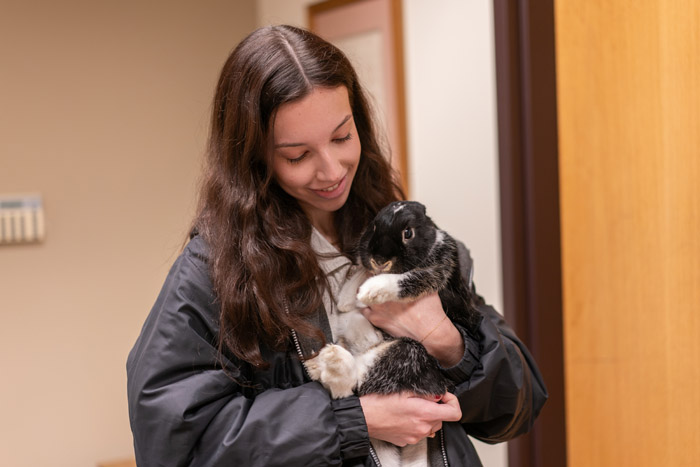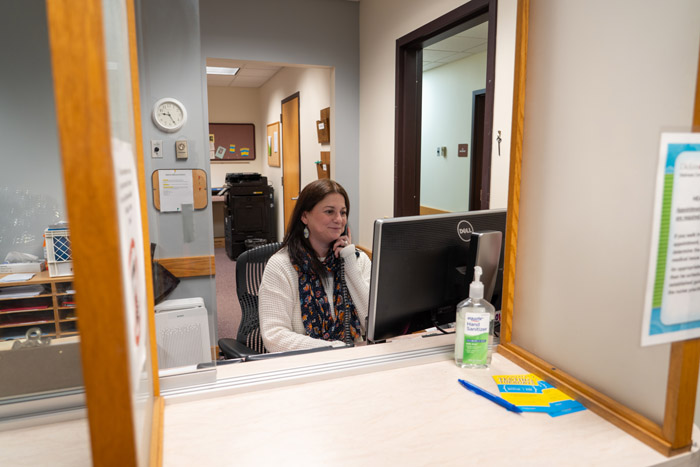Inside Dickinson’s Wellness Center

Redefining student care with a holistic approach focused on overall student well-being.
by Alex Sonfield '25; photos by Dan Loh
Dickinson’s Wellness Center has emerged as more than a place for medical needs; it's a holistic oasis. The primary objective is to support students in becoming the best versions of themselves, not only in an academic capacity but also in their day-to-day lives.
"Our integrated model is what sets us apart," Lauren Strunk, the center's director, explains. The Wellness Center intertwines health and counseling services, creating a safety net where students' medical and psychological needs are met. This seamless synergy is made possible through a unified electronic health record system, ensuring that overlapping concerns are promptly and efficiently addressed.
Functioning as the student's primary care provider on campus, the center covers various health services, mirroring the care one would receive from their family doctor. "Our role extends from handling routine physicals to more sensitive matters like reproductive health," Strunk states. The center focuses on understanding students' concerns as individuals coming of age, realizing that students are coming to campus as teenagers and leaving as independent adults.
Awareness and accessibility are the cornerstones upon which the Wellness Center builds its robust support system. Strunk is particularly proud of initiatives like Testing Tuesdays (free STI testing), the multitude of clinical and nonclinical workshops, and students’ 24/7 after-hours access to mental health and medical professionals using third-party partners. "Students must have unfettered access to care, any time of day," she adds.
However, the Wellness Center's approach also goes beyond just treating illnesses. Innovative programs such as animal-assisted therapy highlight the center's commitment to healing in unconventional yet impactful ways. "Our therapy bunnies are more than cute mascots; they're part of the therapeutic process," she shares, emphasizing the softer side of care the center proudly offers.

Todd Drazien, a clinical social worker at the center, emphasizes the importance of identity-matching counseling. "Connecting students with counselors who share similar backgrounds fosters deeper understanding and trust,” he explains. The team, a diverse group of psychologists, nurse practitioners and administrative staff, is tailored to meet this broad spectrum of student needs. Each member brings expertise, ensuring the center operates beyond a one-size-fits-all approach. Students echo the impact of these initiatives.
"The Wellness Center's inclusive atmosphere, fostered by the staff's dedication, has positively impacted my college experience," remarks Kyla Simancas ’25 (Spanish & Portuguese studies, international business & management).

Strunk acknowledges the limitations of the center, emphasizing a comprehensive approach to services. "When a student's needs surpass our resources, we recognize the necessity of external referrals," she states, ensuring consistent, appropriate care. The center collaborates closely with the Carlisle community, including UPMC Carlisle and Urgent Care for continuity of care, Phoenix Physical Therapy for concussion treatments, and the National Alliance for Mental Illness (NAMI) for mental health programs. These partnerships not only enhance the center's services but also integrate students into the broader community. "These connections are crucial in extending our resources and demonstrating our commitment to care," Strunk adds.
Outreach and education are critical to the center's mission. The office is instrumental in fostering a proactive wellness culture on campus. Last year the center introduced the Wellness for Lifelong Learning (WELL) Office, located in the student life suite of the HUB, where students can meet with center staff to plan outreach events and programs. Dickinson community members can also request wellness staff or peer educators to facilitate programs on campus based on a variety of wellness topics.
"We're not just here to react to health issues,” explains Strunk. “We're here to equip students with the tools to create lifelong wellness habits."
TAKE THE NEXT STEPS
Published December 18, 2023